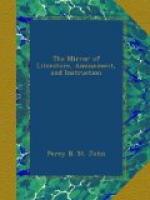Here I picked up but little, for there was but little to pick up. I learned, however, to call for “Red tape and sealing-wax”—to cry “What a bore!” “Did you ever see such a quiz?”—to call “Lord Charles,” “Mr. Henry,” and pronounce “good for nothing”—a remark applied by the young men to the pens, which they flung away by hundreds, and which the servants picked up and sold, with other perquisites of office incidental to their calling. Whenever I applied these acquisitions with effect, it was always attributed to chance; but I was so tormented and persecuted by Lord Charles and Mr. Henry, who being unpaid attaches, had nothing to do, and helped each other to do it, that I took every opportunity to annoy them. One day, when the ante-room was filled with young officers of the British frigate, one of the boobies, pointing to Lord Charles, called to me, “Poll, who is that?” I answered, “Red tape and sealing-wax;” and raised a general shout at the expense of the little diplomatic pedant. An Irish midshipman present, a Mr. O’Gallagher, pointing to Mr. Henry, asked me, “Who is that, Poll?” “Good for nothing,” I replied; and Mr. Henry flew at me in a rage, swore I had been taught to insult him, and that he would wring my neck off. This he would have done but for the protection of the chaplain, to whose breast I flew, and who carried me away to his own room. In a few days I was consigned to Mr. O’Gallagher, the midshipman, as a present to the chaplain’s patroness, a lady of high rank and celebrated sanctity in Ireland, near to whose Propaganda the family of O’Gallagher resided. I was the bearer of a letter of introduction, in which my pious education and saintly acquirements were set forth, my knowledge of the Creed exposed, and myself recommended as a means of aiding her ladyship’s proselyting vocation, as animals of less intelligence had done before. I embarked therefore on board the British frigate—an honour which had been refused my old master, and was treated with great care and attention during the voyage. On arriving in a British port, my young protector got leave of absence, and took a passage in a vessel bound for Dublin. On the morning of our coming to anchor, my cage was put on shore on the quay, while O’Gallagher returned to look after his luggage. Thus left to myself, I soon attracted the attention of a wretched, squalid-looking animal, something between a scare-crow and a long-armed gibbon. His melancholy visage dilated into a broad grin the moment he saw me; and coming up, and making me a bow, he said, “Ah! thin, Poll, agrah, you’re welcome to ould Ireland. Would you take a taste of potato, just to cure your say-sickness?” and he put a cold potato into my cage, which he had been gnawing with avidity himself. The potato was among the first articles of my food in my native paradise, and the recollection of it awakened associations which softened me towards the poor, hospitable creature who presented it. Still I hesitated, till he said, “Take it, Miss, and




